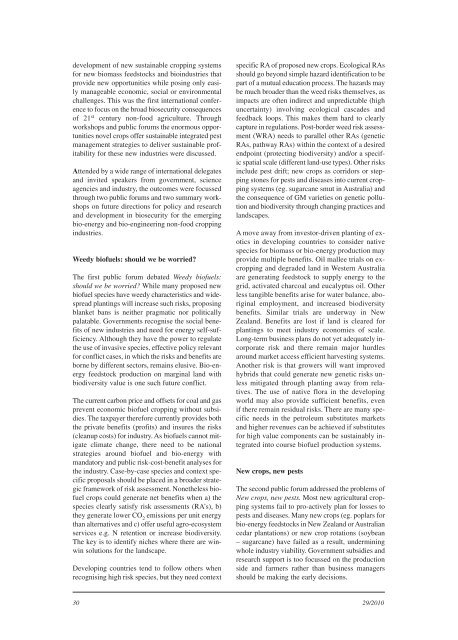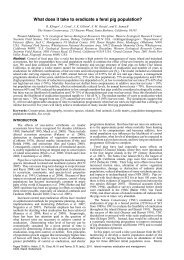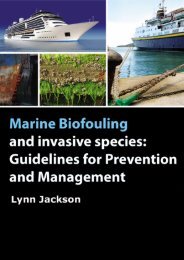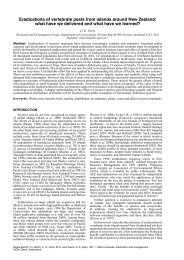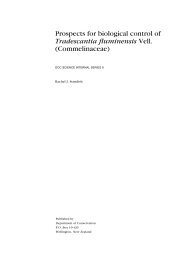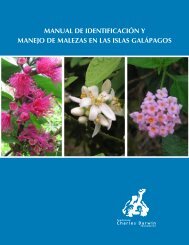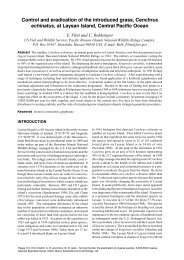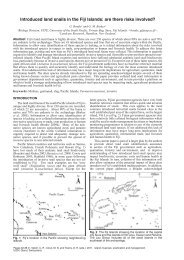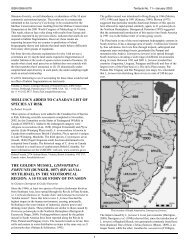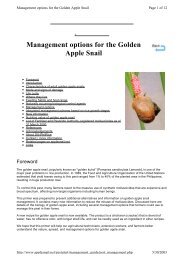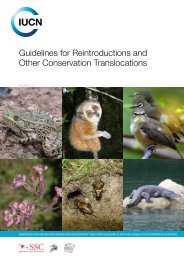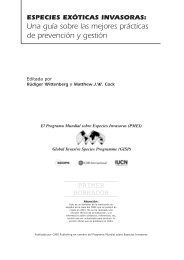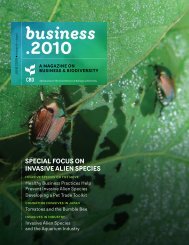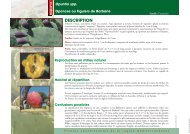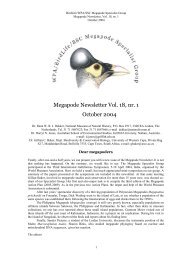Aliens Newsletter - ISSG
Aliens Newsletter - ISSG
Aliens Newsletter - ISSG
Create successful ePaper yourself
Turn your PDF publications into a flip-book with our unique Google optimized e-Paper software.
development of new sustainable cropping systems<br />
for new biomass feedstocks and bioindustries that<br />
provide new opportunities while posing only easily<br />
manageable economic, social or environmental<br />
challenges. This was the first international conference<br />
to focus on the broad biosecurity consequences<br />
of 21 st century non-food agriculture. Through<br />
workshops and public forums the enormous opportunities<br />
novel crops offer sustainable integrated pest<br />
management strategies to deliver sustainable profitability<br />
for these new industries were discussed.<br />
Attended by a wide range of international delegates<br />
and invited speakers from government, science<br />
agencies and industry, the outcomes were focussed<br />
through two public forums and two summary workshops<br />
on future directions for policy and research<br />
and development in biosecurity for the emerging<br />
bio-energy and bio-engineering non-food cropping<br />
industries.<br />
Weedy biofuels: should we be worried?<br />
The first public forum debated Weedy biofuels:<br />
should we be worried? While many proposed new<br />
biofuel species have weedy characteristics and widespread<br />
plantings will increase such risks, proposing<br />
blanket bans is neither pragmatic nor politically<br />
palatable. Governments recognise the social benefits<br />
of new industries and need for energy self-sufficiency.<br />
Although they have the power to regulate<br />
the use of invasive species, effective policy relevant<br />
for conflict cases, in which the risks and benefits are<br />
borne by different sectors, remains elusive. Bio-energy<br />
feedstock production on marginal land with<br />
biodiversity value is one such future conflict.<br />
The current carbon price and offsets for coal and gas<br />
prevent economic biofuel cropping without subsidies.<br />
The taxpayer therefore currently provides both<br />
the private benefits (profits) and insures the risks<br />
(cleanup costs) for industry. As biofuels cannot mitigate<br />
climate change, there need to be national<br />
strategies around biofuel and bio-energy with<br />
mandatory and public risk-cost-benefit analyses for<br />
the industry. Case-by-case species and context specific<br />
proposals should be placed in a broader strategic<br />
framework of risk assessment. Nonetheless biofuel<br />
crops could generate net benefits when a) the<br />
species clearly satisfy risk assessments (RA’s), b)<br />
they generate lower CO 2 emissions per unit energy<br />
than alternatives and c) offer useful agro-ecosystem<br />
services e.g. N retention or increase biodiversity.<br />
The key is to identify niches where there are winwin<br />
solutions for the landscape.<br />
Developing countries tend to follow others when<br />
recognising high risk species, but they need context<br />
specific RA of proposed new crops. Ecological RAs<br />
should go beyond simple hazard identification to be<br />
part of a mutual education process. The hazards may<br />
be much broader than the weed risks themselves, as<br />
impacts are often indirect and unpredictable (high<br />
uncertainty) involving ecological cascades and<br />
feedback loops. This makes them hard to clearly<br />
capture in regulations. Post-border weed risk assessment<br />
(WRA) needs to parallel other RAs (genetic<br />
RAs, pathway RAs) within the context of a desired<br />
endpoint (protecting biodiversity) and/or a specific<br />
spatial scale (different land-use types). Other risks<br />
include pest drift; new crops as corridors or stepping<br />
stones for pests and diseases into current cropping<br />
systems (eg. sugarcane smut in Australia) and<br />
the consequence of GM varieties on genetic pollution<br />
and biodiversity through changing practices and<br />
landscapes.<br />
A move away from investor-driven planting of exotics<br />
in developing countries to consider native<br />
species for biomass or bio-energy production may<br />
provide multiple benefits. Oil mallee trials on excropping<br />
and degraded land in Western Australia<br />
are generating feedstock to supply energy to the<br />
grid, activated charcoal and eucalyptus oil. Other<br />
less tangible benefits arise for water balance, aboriginal<br />
employment, and increased biodiversity<br />
benefits. Similar trials are underway in New<br />
Zealand. Benefits are lost if land is cleared for<br />
plantings to meet industry economies of scale.<br />
Long-term business plans do not yet adequately incorporate<br />
risk and there remain major hurdles<br />
around market access efficient harvesting systems.<br />
Another risk is that growers will want improved<br />
hybrids that could generate new genetic risks unless<br />
mitigated through planting away from relatives.<br />
The use of native flora in the developing<br />
world may also provide sufficient benefits, even<br />
if there remain residual risks. There are many specific<br />
needs in the petroleum substitutes markets<br />
and higher revenues can be achieved if substitutes<br />
for high value components can be sustainably integrated<br />
into course biofuel production systems.<br />
New crops, new pests<br />
The second public forum addressed the problems of<br />
New crops, new pests. Most new agricultural cropping<br />
systems fail to pro-actively plan for losses to<br />
pests and diseases. Many new crops (eg. poplars for<br />
bio-energy feedstocks in New Zealand or Australian<br />
cedar plantations) or new crop rotations (soybean<br />
– sugarcane) have failed as a result, undermining<br />
whole industry viability. Government subsidies and<br />
research support is too focussed on the production<br />
side and farmers rather than business managers<br />
should be making the early decisions.<br />
30 29/2010


